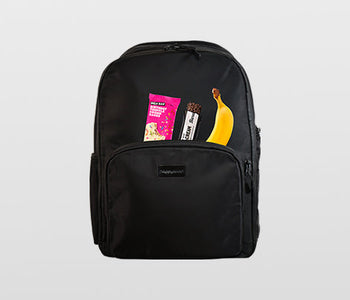Ah, night shifts! The sun is going down, but your day is just getting started. Working the 12-hour night rotation, or as some lovingly call it, “graveyard shift,” we know nurses are faced with unique work challenges like sundowning patients, family visitation and nighttime protocols, among many others. However, in order to best care for others, you need to prioritize YOU!
10 tips for nurses & doctors working the night shift
To get started, we have compiled our top 10 tips to help keep you feeling healthy, energized, and focused while on and off the clock.
1. stick to a routine
This is the most important tip but also the hardest to consistently follow because let’s be honest, life happens. Our bodies have an innate circadian rhythm that helps regulate periods of being awake and asleep. Working night shifts totally interrupts that natural pattern. That’s why creating (and sticking to) a daily routine will optimize your physical, mental and emotional health. An ideal night nurse routine includes:
- scheduling time for sleep
- healthy meals
- personal hygiene
- physical activity
- a social life
- self care
Take a look at your work schedule and see if you can cluster your shifts as this can help develop a consistent work-life balance.
2. sleep is your best friend
We all know that adults need 7-9 hours of sleep each day, easier said than done, right?! It’s a basic human that needs to be prioritized, especially for night shift workers. Begin with building your routine around getting adequate sleep. Pick a timeframe that works for you and your family. Then, create an environment that is conducive to falling and staying asleep.
This may mean investing in blackout curtains, turning on a sound machine or curling up with a weighted blanket. Naps are also an option, although we don’t recommend replacing solid sleeping time with cat-naps - they won’t sustain you long-term.
3. water. water. water.
Nursing is extremely physical work. Standing on your feet for long hours, charting in the EMR and assisting patients turn and position take a lot out of you. Before, during and after your shift, focus on staying hydrated. Opt for water and avoid energy drinks, carbonated sodas and sugary beverages. They may taste good, but they’re not doing your body any favors. Adding lemon juice or infusing fresh fruit can help add that pop of flavor, if you need. Other tips: always keep a water bottle within reach, log your intake and set timed reminders
4. eat healthy... well try to
Our bodies need fuel to get through long shifts. When creating your routine, ensure it includes three balanced meals. Select quality ingredients and foods that are healthy, fresh and non-processed. Although difficult, avoid options that are high in salt, sugar and carbohydrates. Again, that pint of ice cream feels good in the moment, but it’s not supporting your overall health. Meal prepping is strongly recommended. By preparing meals and snacks in advance, you are more likely to eat healthier foods and portions to hopefully curb over indulging and hitting the vending machine at 2am. Here are 32 healthy perp ideas for healthcare professionals!
5. become one with coffee
Okay, okay, okay… even though caffeine isn’t the best option when talking about hydration, we would be remiss to talk about this night shift staple. Grabbing a cup of coffee or tea can definitely help give you that boost when you’re feeling low energy. Our tip here is to drink caffeine beverages in moderation, avoid adding extra sweeteners and enjoy the aroma and taste because you earned it.
6. move that body
We know you’re tired but exercise is crucial to a night nurse’s routine. Getting your heart pumping and stretching those muscles is important not just for your body, but for your mind too. Stay active during work by climbing stairs, walking during break or parking your car farther away. While off-shift, try:
- going for a walk
- start running
- yoga
- going for a swim
- group workout classes
The point is, it doesn’t matter WHAT you do, as long as you do SOMETHING to keep your body active.
7. your safety is #1
On this list, we didn’t want to underscore the importance of safety, especially when coming to and from work. Because you may feel fatigued or tired at times, before getting behind the wheel to drive, we ask that you do a moment of self-reflection. Ask yourself, “Do I feel alert?,” “Are my eyelids heavy?,” and “Could I easily fall asleep right now?” If you don’t feel 100% to drive, don’t. Call an Uber, car pool with a colleague or rest your eyes – it’s not worth the risk.
8. peer support is key
Talking about our day – highs and lows – is important. So when your family and friends don’t revel in your epic Code Blue story or laugh about yesterday’s disastrous c-diff debacle, that’s okay. Rely on your fellow healthcare friends and colleagues to listen, support and guide you when you need it most. They can best relate what you’ve experienced and what you may be feeling. Take time to chat in the breakroom, start a group text or simply grab coffee after a shift.
9. find time for you & destress
Constant multitasking, non-stop critical thinking and empathetically caring for patients and families is what makes nursing extremely stressful at times. Then, tack on personal responsibilities! It’s incredible what we accomplish each day. In your routine, carve out time to unwind and destress. Try a holistic approach like:
- breathing exercises
- meditation
- reflexology
- mindfulness
- journaling
It can also less structured things such as listening to music or a podcast, talking to a coworker, taking a long shower or thumbing through pictures on your phone. Like the saying goes, “you can’t pour out of an empty cup,” as a nurse, you can’t give empathy unless you show yourself some self-love first.
10. find balance
Your work-life balance is a team sport. Talk regularly with your family, roommate or whomever you live about how you are doing. Share your daily routine with them so they can understand, accommodate and support your success. Be honest when you need help. You’re not in this alone.
23 Items Every Nursing Student Needs in Their Backpack
To help you survive nursing school we’ve compiled our top 23 essentials that every nursing student should have in their backpack. Invest in a durable and versatile backpack that’s comfortable...
Read moreDay In The Life Dental Hygienist
Take a peek into the Day In The Life of a Dental Hygienist withWhitney DiFoggio RDH, BS!
Read more

